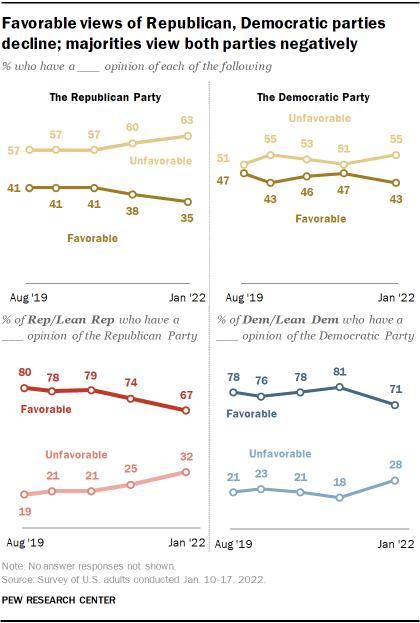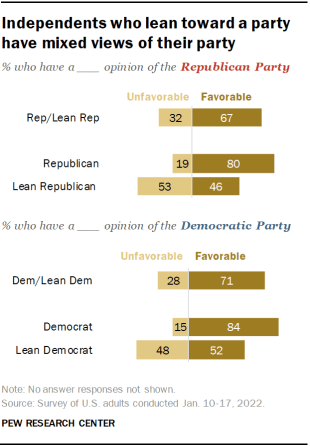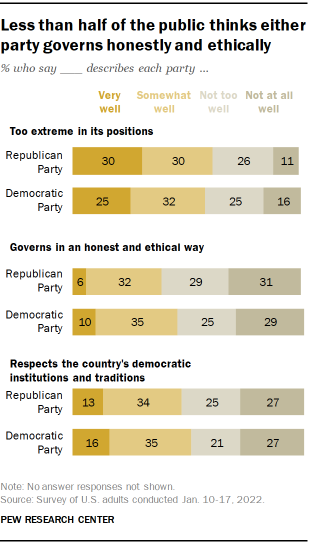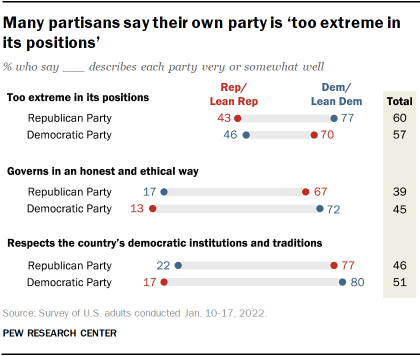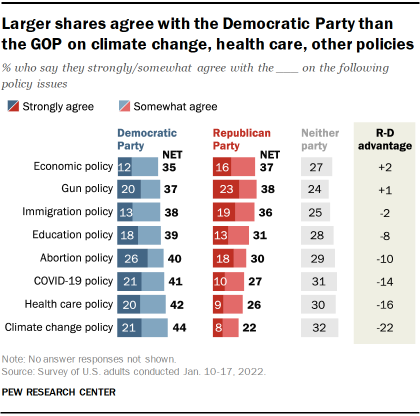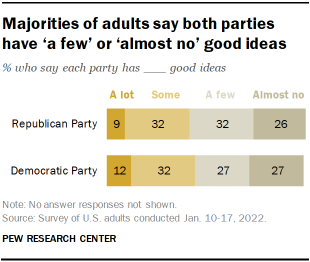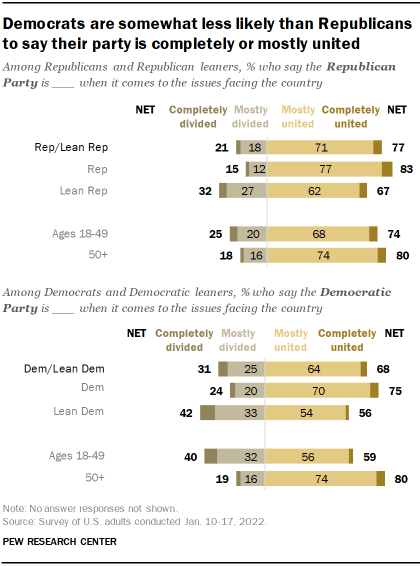Ahead of this year’s midterm elections, the Democratic Party is viewed more favorably than the Republican Party. And on several key issues, including the coronavirus, health care and education, more Americans say they agree with the policies of Democrats than Republicans.
Still, many Americans are skeptical of both parties. For example, fewer than half of Americans say the Democratic Party (45%) and Republican Party (39%) “governs in an honest and ethical way.”
Favorable views of both parties have slipped since last March. Today, 35% of adults say they have a favorable opinion of the Republican Party – down slightly from 38% about a year ago. Similarly, 43% of adults give the Democratic Party a favorable rating today; this is 4 percentage points lower than last March
Fewer Democrats and Republicans give their own party favorable ratings than did so last year. Since March 2021, the share of Republicans and Republican-leaning independents who view their own party favorably has fallen 7 percentage points (74% then vs. 67% today). Among Democrats and Democratic leaners, favorable ratings have declined by 10 percentage points (81% in March vs. 71% today).
As has been the case for the past several years, large majorities of partisans given the opposing party negative ratings: 90% of Democrats and Democratic leaners say they have an unfavorable view of the Republican Party, while an identical share of Republicans and GOP leaners have an unfavorable opinion of the Democratic Party.
Independents who lean toward a party – unlike those who identify as Republicans or Democrats – express lukewarm views toward their party. While 80% of Americans who identify as Republicans have a favorable view of their party, just 46% of those who leantoward the GOP do so. A sizable share of Republican leaners (53%) hold an unfavorable view of the Republican Party.
Yet independents who lean toward the GOP have much more negative views of the Democratic Party. In fact, 86% of Republican leaners have an unfavorable impression of the Democratic Party, which is only somewhat lower than the share of Republican identifiers who view the Democrats negatively (92%).
The pattern is similar among those who identify with or lean toward the Democratic Party. Among those who say they consider themselves a Democrat, 84% hold a favorable view of the party. Those who lean toward the Democratic Party are much more divided: 52% have a favorable opinion, while 48% have an unfavorable opinion. However, Democratic leaners are almost as likely to have an unfavorable opinion of the Republican Party as those who identify as Democrats – 87% and 91%, respectively. (For more on independents and partisan leaners, see “Political Independents: Who They Are, What They Think.”)
Substantial shares say both parties are ‘too extreme in their positions’
Comparable shares of Americans say that both the Republican and Democratic parties are too extreme in their positions, while the Democratic Party holds modest advantages with the public on governing honestly and ethically and respecting the country’s democratic institutions and traditions.
Six-in-ten adults say the phrase “too extreme in its positions” describes the Republican Party very or somewhat well, while a similar share of the public (57%) says this about the Democratic Party.
Fewer than half of adults (45%) say the phrase “governs in an honest and ethical way” describes the Democratic Party at least somewhat well; even fewer (39%) say the same about the Republican Party.
And while about half of adults (51%) say that “respects the country’s democratic institutions and traditions” describes the Democratic Party very or somewhat well, a somewhat smaller share of Americans (46%) say the same about the GOP.
Republicans and Democrats generally view their own parties in a positive light while offering critical assessments of the opposing party. However, roughly four-in-ten Republicans (43%) – and a comparable share of Democrats (46%) – say “too extreme in its positions” describes their own party at least somewhat well.
By contrast, sizable majorities of both Republicans (67%) and Democrats (72%) say their party governs in an honest and ethical way and respects the country’s democratic institutions and traditions (77% of Republicans say this about the GOP, 80% of Democrats say it about the Democratic Party).
More agree with the Democratic Party than Republican Party on several key policy issues
Americans are more likely to say that they agree with the Democratic Party than the Republican Party on several policy issues, including climate change, health care, and COVID-19.
Among eight policy issues included, there is none on which a significantly larger share agrees with the Republican Party. However, roughly similar shares agree with each party on policies addressing the economy, guns and immigration.
Across the eight issue areas, between about a quarter and a third of adults say they agree with neither party.
On policies to deal with climate change, 44% of Americans say they agree with the Democratic Party, compared with roughly two-in-ten (22%) who say the same about the Republican Party. The public is also more likely to say that they strongly agree with the Democratic Party than with the Republican Party (21% vs. 8%).
This pattern also holds for several other issues. Roughly four-in-ten adults say they agree with the Democratic Party when it comes to health care policy (42%), policies to deal with the health impact of the coronavirus (41%), abortion policy (40%) and education policy (39%). About three-in-ten adults say they agree with the Republican Party on each of these policy areas, and roughly similar shares say they agree with neither party.
While the Republican-Democratic balance on many of these questions is little changed over recent years, the share of Americans saying they agree with neither party has increased on economic and healthcare policy since 2019.
Among Democrats, majorities of between 60% and 70% they agree with their party on each of the eight policy issues, but there is more variation among Republicans. More than seven-in-ten Republicans say they agree with their party on gun policy, economic policy and immigration policy, while fewer than half (45%) say they agree with the GOP on policies dealing with climate change.
Few say either party has ‘a lot’ of good ideas
The public faults both parties for having a paucity of good ideas. About a quarter (26%) say the Republican Party has “almost no” good ideas, while another 27% say it has “a few good ideas.” Only about four-in-ten (41%) say it has “some” (32%) or “a lot” of good ideas.
Overall views of the Democratic Party are not much different: 44% say it has at least some good ideas, with just 12% saying it has a lot of good ideas.
Majorities of Republicans (69%) and Democrats (70%) say their party has a lot or some good ideas while largely dismissing the ideas of the other party (just 13% of Republicans say the Democrats have at least some good ideas; 19% of Democrats say this about the GOP).
Overall, 14% of Americans say that both the Republican and Democratic parties have at least some good ideas, while 27% see no more than a few good ideas from either party.
Most partisans see their party as ‘mostly united’
Among partisans, large majorities say that their own party is either completely or mostly united when it comes to the issues facing the country.
At the same time, those who identify as Republicans or Democrats are more likely than those who lean toward that party to say that their party is united.
Most Republicans (77%) say that their party is united, with 71% saying their party is mostly united. Only 6% of Republicans say their party is completely united. About two-in-ten Republicans (21%) say their party is divided, with just 3% saying their party is completely divided. Republican leaners are less likely than those who identify directly with the GOP to say their party is united: 83% of Republican identifiers say their party is united, while two-thirds of Republican leaners say the same.
Together, about two-thirds of Democrats and Democratic leaners (68%) say that their party is united when it comes to the issues facing the country, including only 4% who say the party is completely united. Adults who identify with the Democratic Party are 19 percentage points more likely to say that their party is united than are Democratic leaners (75% vs. 56%).
Among Democrats and leaners combined, view of whether their party is united differ across age groups, with younger Democrats less likely to say that the party is united. Younger Democrats (ages 18 to 29) are about as likely to say that their party is completely or mostly united (52%) as they are to say it is completely or mostly divided (46%). About six-in-ten Democrats ages 30 to 49 (63%) say their party is united, with 36% saying it is divided. Eight-in-ten Democrats 50 and older say their party is united. This pattern holds among both Democratic identifiers and Democratic leaners.
Among Republicans, those ages 50 and older are somewhat more likely than adults under 50 to say that their party is united when it comes to the issues facing the country (80% vs. 74%).


